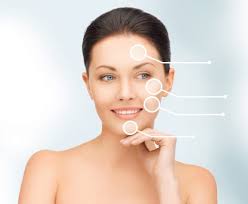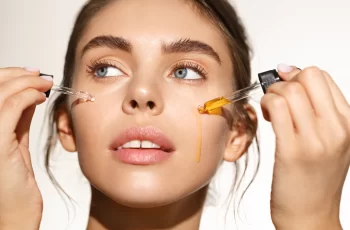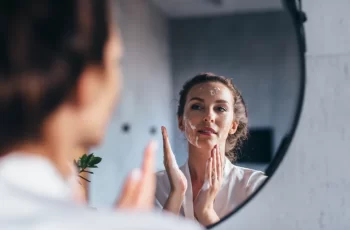Oils in Skin Care Products
The best oils to use in skin care products depends upon your skin type because oils have many different skin benefits.
You need to know what issues your skin has before buying an oil to use in your skin care routine.
Oils are found in a variety of products including moisturizers and serums.
To find a good natural oil for your skin, look and see which fatty acids the oils contains.
Fatty acids impart many of the benefits that oils have in skin care.
Oils greatly affect how well your skin care routine will work by influencing absorption of other products in your skin care routine.
Oils hydrate the skin and provide protective barriers to keep water in the skin.
Oils can be used to treat:
Eczema
Psoriasis
Acne
Rosacea
The best oil for your skin depends on which of the 16 Baumann Skin Types you are.
What makes something an oil?
An oil is a substance that is liquid at room temperature and insoluble in water.
Oils are a type of lipid, which is basically a synonym for fat.
Lipids are defined as molecules that are dissolvable in nonpolar solvents.
They are hydrophobic, meaning they repel water.
There are three classes of lipids:
Triglycerides: Formed from glycerol and 3 fatty acids.
Phospholipids: Made of two fatty acids, a glycerol and a phosphate.
Sterols: Alcohols that are a subgroup of steroids with a hydroxyl group.
Oils are triglycerides that are fluid at room temperature.
Oils contain fatty acids.
Fatty acids can be classified as saturated, monounsaturated or polyunsaturated based on their hydrogen-carbon bonds.
The benefits of oils in skin care depends on the type of fatty acids the oil contains.
Most popular oils in skin care
What are the best oils for skin care?
Oils vary in efficacy based on their fatty acid composition and the way they were processed, bottled and stored.
16 of the most commonly recommended oils in skin care:
Argan oil
Avocado oil
Borage seed oil
Coconut oil
Evening Primrose oil
Grape seed oil
Jojoba oil
Mineral oils
Olive oil
Rose oil
Rosehip oil
Sesame oil
Soybean oil
Sunflower oil
Tea tree oil
Tsubaki oil
how often should you use oils
How often should you put oil on your face?
Whether or not to use oil on your face depends upon your skin type.
Do not use oil on your face if you are an oily skin type.
If you are a dry skin type, you can use oil once or twice a day on your face.
Extremely dry skin types can use oil 3-4 times a day on the body if necessary, and 2-3 times on the face.
To find the best skin care regimen for your skin type, take the quiz and see get a custom skin care regimen.
Take the Quiz
Benefits
Oils can serve multiple purposes in skin care, but are used primarily in moisturizers.
They can work as occlusives, which create a barrier on skin that prevents dryness by preventing water from evaporating off of the skin.
They can help restore lipids and fatty acids to the skin barrier.
Fatty acids give them other qualities depending on the fatty acid.
Products containing linoleic acids are anti-inflammatory.
Oils with unsaturated fatty acids can lighten dark spots.
All oils smooth skin and help it glow.
Safety
Yes, oils are used in myriad skin care products as moisturizing ingredients and do not pose any particular risks if used appropriately.
Some oils such as lanolin or petrolatum have been observed to cause allergic reactions in some skin types.
To see which oils are right for your skin care regimen, click here to learn more about the Baumann Skin Types.
What are plant oils
What are plant oils?
Plant oils and extracts are among the most popular oils in skin care and are naturally sourced.
Plant oils and extracts are sometimes called of essential oils, check out our article on essential oils in skin care to learn more!
Several oils such as Argan oil are harvested by growers trying to give their local community better jobs, living conditions and pay.
As people grow increasingly environmentally conscious, they turn to skincare products with natural oils rather than synthetic occlusive ingredients like dimethicone and petrolatum.
Plant oils like extra virgin olive oil have been shown to have antioxidant properties.
Oils
Does using oil-based products lower natural oil production in skin?
There used to be a common misunderstanding that using oils on the skin reduced long term sebum production.
People stopped expressing this opinion in the early 2000’s, as those claims were shown to be false in multiple studies.
Using oils on the skin does not interfere or change the amount of secretions from the sebaceous gland,
It is commonly accepted that products like oil-based moisturizers do not inhibit natural facial oil production.
What does “oil-free” mean on skin care product labels?
You can tell if a product has oil in it by reading the skin care product label. The ingredient will have have the word “oil” in the INCI name.
Oil-free means that no ingredients with “oil” in the INCI name are in the product.
There are ingredients that are not classified as oils that make products feel greasy, and are not optimal for patients with oily skin. These may be found in products labeled as oil-free.
Oil-free products can be comedogenic.
In other words, products labeled “oil free” products still run the risk of feeling oily and clogging pores.
Oils on skin absorption
Moisturizing
Oils moisturizer the skin in several ways, they:
Provide occlusion
Prevent water evaporation form skin’s surface
Push other ingredients into the skin
Supply fatty acids that can help strengthen the skin barrier
Best oils in skin moisturizers?
The best oil to choose for your skin depends upon what skin issues you have.
There are multiple types of moisturizers that all work a little differently.
Many kinds of oils are considered great for skin care, but the product that’s best for you depends on your skin type.
DQH Knowledge drop: In your 20s, your skin cell turnover decreases. (Cell turnover is a key component in keeping your skin youthful.) You know what else slows down? Your collagen production. Starting in your 20s, collagen decreases by about 1 percent per year. Should you want to prevent fine lines and wrinkles, start by eliminating behaviors that contribute to premature aging. “If it’s bad for you, it’s bad for your skin,” says dermatologist Michel Somenek.
“Cigarette smoking reduces blood flow to the skin and causes premature wrinkling and a dull skin texture. Making the repeated pursed motion to inhale can also cause smoker’s lines. Alcohol and recreational drugs are toxins for the skin that damage its cellular structure and DNA,” Somenek tells us. “The faster you eliminate vices while you are young, the better chance your skin and body have to recuperate.” Also, adopting an anti-aging routine in your 20s is key. After all, the best offense is a good defense. We spoke to Somenek and experts Joshua Ross and Audrey Kunin to find out more.
Keep reading for the best anti-aging products for your 20s, according to skincare professionals.
Sunscreen
“We all know that the sun is the number one cause of skin aging and starting the prevention in your 20s is very important,” Ross says. “The majority of your sun damage won’t start to appear until you’re in your 30s, so don’t wait until you see it surface or you’ll be behind the curve. Stay ahead of it with a good-quality zinc-based sunscreen worn daily.”
Farmacy Green Defense Daily Mineral Sunscreen
An invisible sunscreen with SPF 30, plus botanical extracts meant to protect skin with tons of antioxidants. Bonus: It’s clean and fine to use under makeup.
Bareminerals Complexion Rescue™ Tinted Moisturizer Broad Spectrum SPF 30
Although we recommend you use your SPF and moisturizer separately, we also understand moments when you don’t have time or energy for that extra step. For those times, this bareMinerals moisturizer is a great thing to have on hand.
Vitamin C Serum
“A great introduction to anti-aging is to start with a vitamin C serum in your morning skincare routine,” Ross says. “It’s a powerful antioxidant that will neutralize free radicals and brighten the skin.” He adds that it’s a great way to counteract the effects of the sun’s harmful rays, which, as previously mentioned, are among the biggest causes of premature aging.
Drunk Elephant C-Firma™ Vitamin C Day Serum
The Drunk Elephant C-Firma is a lightweight serum that promises to give skin a glow by combining the brightening powers of vitamin C with ferulic acid, l-ascorbic acid, and vitamin E. The included sodium hyaluronate is meant to replace hydration loss, so you shouldn’t have to deal with any irritation.
Sunday Riley C.E.O. Rapid Flash Brightening Serum
This potent serum is jam-packed with vitamin C (15 percent, to be exact), which means it’s a potential superstar at both brightening skin and dousing it in antioxidants.
Peptides
Using peptides on your skin has many benefits, says Somenek. “The skin barrier is what defends the body against pollution, UV rays, bacteria, and toxins. It can be damaged by several everyday factors. Using topical peptides aids in building a stronger barrier,” he says. “Peptides comprise elastic fibers, which are a type of protein. These fibers help to make skin appear taut and firm. Peptides can also help repair damaged skin, relieve inflammation, and even out skin tone. Some peptides can kill acne-causing bacteria that is common in 20-somethings.”
Kunin agrees, saying, “Peptides are an excellent entry point for supporting collagen.” She recommends looking for face and eye treatments that contain these collagen-boosting powerhouses.
Charlotte Tilbury Magic Eye Rescue Cream
This Charlotte Tilbury super-emollient eye cream has a base of coconut oil and shea butter (read: it’s incredibly hydrating). Botanicals plus peptides are meant to help reduce dark circles and boost collagen, respectively.
This creamy moisturizer serves up potent collagen-boosting peptides and pycnogenol, and antioxidant-rich vitamin C. “Instead of sitting on top of the skin, peptides penetrate the outer layer so they go deep. The ‘signals’ they send tell the cells to produce elastin and collagen, which are needed for youthful-looking skin,” explains Somenek.
At-Home Peel Pads
Remember that skin cell turnover fiasco we talked about earlier? One way to help support it is by exfoliating. “Exfoliation is important to help keep skin fresh and luminous,” Kunin says. She recommends using at-home peel pads as an easy and effective way to exfoliate.
“The goal in your 20s is to fight the slowing pace of cell turnover. It is wise to use products that gently exfoliate, yet still remove oil and other impurities. Products that have Alpha Hydroxy Acids (AHA) or Beta Hydroxy Acids (BHA) are a good choice.”
According to Somenek, you should only exfoliate two to three times a week. “People of all ages are guilty of over-exfoliating and that can be too much of a good thing,” he says.
Dermadoctor Kakadu C Intensive Vitamin C Peel Pad
A few swipes of this Derma Doctor powerful peel pad promise to leave your skin glowing and smooth, thanks to the seven (yes, seven) types of chemical exfoliants, including AHA and BHA. It also contains vitamin C via Kakadu plum extract for added brightening and antioxidant protection.
KEY INGREDIENTS Kakadu plum extract is sourced from the Kakadu plum, a fruit grown in northern Australia. It contains vitamin C, which restores the skin’s natural barrier, increases collagen production, and soothes irritation.
Dr. Dennis Gross Skincare Alpha Beta® Universal Daily Peel Pads
These are the gold standard of peel pads, with a cult following and over 900 five-star reviews on Sephora. They’re easy to use and contain a blend of anti-aging exfoliating acids.
Emollient Night Cream
“In your 20s, you need to start upping the hydration in your skincare routine. You may have been cautious of over-moisturizing because of acne in your teens, but as you enter your 20s, your skin transitions and becomes drier,” Ross says. “I recommend an emollient night cream added into your evening skincare regimen.”
“Twenty-somethings need to make sure that they are not using creams that will clog their pores and cause excess oil production,” says Somenek. Opt for non-comedogenic products.
Cerave Skin Renewing Night Cream
One great choice is the CeraVe Skin Renewing Night Cream, which is a non-comedogenic night cream that leaves skin soft and glowy. It combines the moisturizing powers of ceramides and hyaluronic acid.
RoC Retinol Correxion Max Hydration Creme
“The best night cream ingredients contain retinol, benzoyl peroxide, and/or salicylic acid or hyaluronic acid. The goal is to moisturize, yet remove excess oil,” says Somenek. This Roc Retinol Correxion cream fits the bill as it contains both hyaluronic acid and retinol so it promises to moisturize while also being non-comedogenic.



